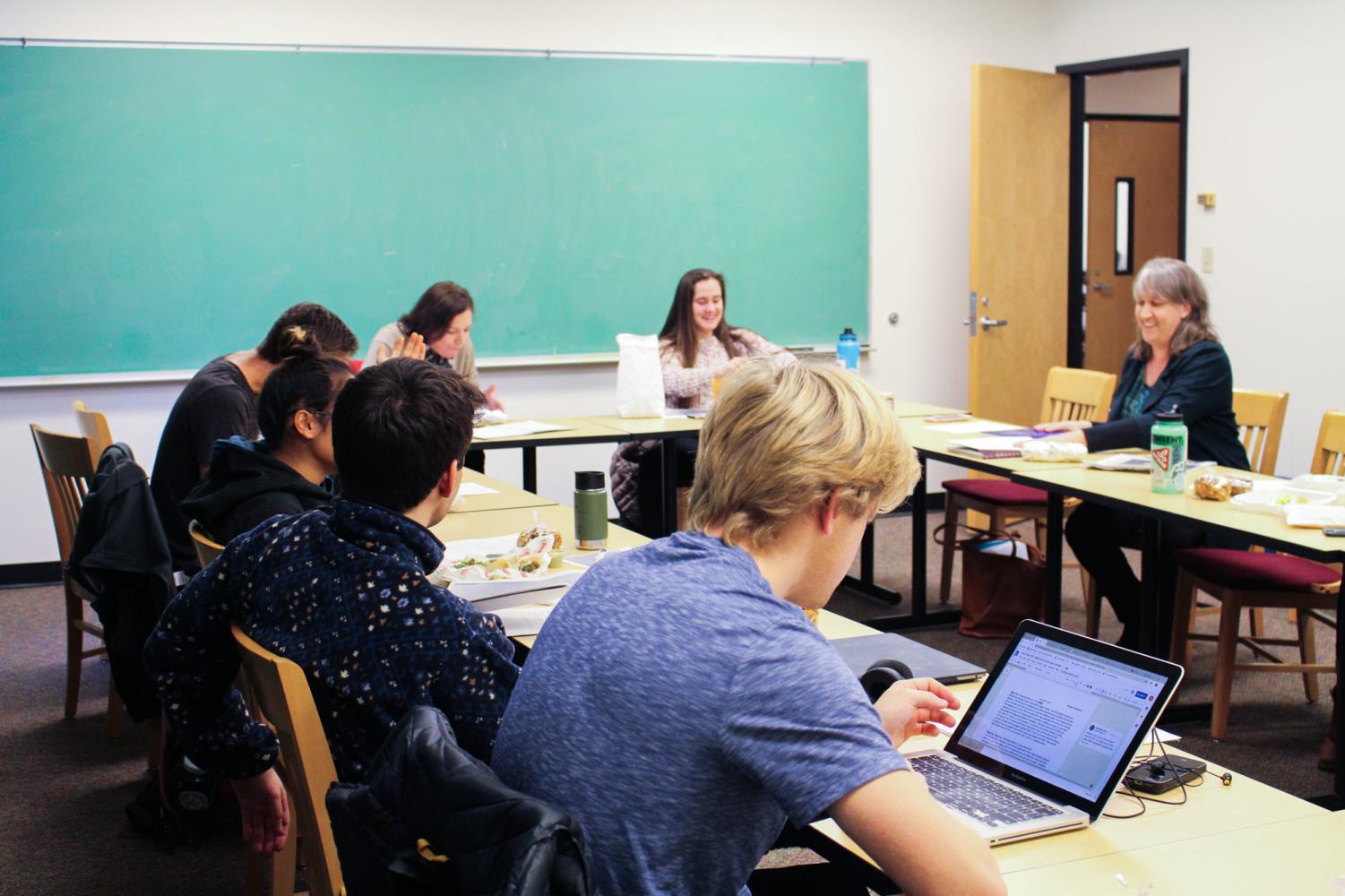Bridging gaps of accessibility in the Walla Walla community
December 12, 2019
At an institution with competitive enrollment based off grades and test scores, Whitman is inherently inaccessible to certain members of the larger community with developmental, intellectual or learning disabilities. However, for students attending Whitman, the institution provides many disability support services, from provided note taking to tutoring for Whitman students with various learning and attention issues (LAI) through the Academic Resource Center and individual professors.
Professor and Chair of Sociology Michelle Janning, who is currently teaching the class “Ability and Community,” points to the responsibility Whitman holds to extend resources to the wider community.
“It seems to me that elite institutions such as Whitman have a responsibility to pay attention to generous and realistic ways that our resources may serve the community beyond the borders of our campus,” Janning said. “Why not include new voices into our conversations?”
This gap is being bridged by Eye to Eye, a Whitman club connecting college, elementary and middle school students with LAIs, and this semester’s “Ability and Community” course taught by Michelle Janning.
Cross-campus connections: Whitman’s “Ability and Community” class
Throughout her schooling, Whitman senior Jessica Boyers has noticed a gap that exists between the general and special education systems. After being a coordinator for Whitman’s Buddy Program, a club that connects Whitman students and adults in the community with intellectual and developmental disabilities, she decided to apply for the Ben Rabinowitz Award and was inspired to create a class entitled “Ability and Community.” In this course, members of the Whitman community and students from the Walla Walla community with developmental or intellectual disabilities come together to learn.

“Ability and Community,” a one-credit sociology class taught by Michelle Janning, is a combined class with Whitman and Walla Walla high school START students.
“My goal for the class was to engage Whitman students with members in the community with developmental/intellectual, or other learning disabilities and to provide the opportunity for STEP students to become part of the Whitman community,” Boyers said.
Boyers co-designed the one-credit course with Janning. The course is co-taught by Cyndy Knight, the director of the Walla Walla Disability Network, and Boyers serves as a teaching assistant. According to Janning, Boyers and Knight compiled much of the content of the course while she added the sociological lens to the class.
“Jess, Cyndy and I worked over the summer to develop course topics, potential field trips and guest speakers and the calendar,” Janning said. “It was great working with Jess. She and Cyndy were heavily responsible for course content (especially related to campus and local resources) and ensuring logistics. I added moments where we could reflect on the sociological concepts at play, and took care of some behind-the-scene communications and meetings with campus students about their written reflections.”
Half of the students of the “Ability and Community” classroom are Whitman students and the other half are students from Walla Walla Public School’s STEP (Students Transitioning into Employment Opportunities) program. Together, the class learns about the sociology of groups, defining ability within community and how access to resources is dependent upon social situation.
“Importantly, this was not a class that was about defining specific disabilities, but instead took a more conceptual approach to how we come to collectively define ability and community through our interactions, communications, experiences and policies,” Janning said.
Structurally, “Ability and Community” can be different from other Whitman sociology classes. Mostly through class discussions and community visits, all students of varying abilities learn through each others’ experiences.
“This class is definitely more of an “applied sociology” class, meaning that we are learning from the activities but also learning just by being around one another. This class was structured to be more discussion-driven, so there was room for everyone to take part in it,” Boyers said.
For Janning, the topic of ability is especially important within the Walla Walla community because access to disability services can be much more limited than in more urban areas.
“Bridging voices between campus and community matters to me, in part because we are all able to learn from each other, and in part because the Walla Walla Valley is a location where resources for individuals with intellectual and developmental abilities are less accessible as compared to more urban or affluent areas,” Janning said.
While all members of the class have learned much from each other, many conversations have shown differences in opinions and perspectives. Even in the face of challenging conversations, Janning emphasizes that all members of the class are extremely understanding and cooperative.
“I think it’s safe to say that all of us in the class had challenging moments, where perhaps the solutions to what we define as problems are not simple, straightforward, or even possible,” Janning said. “We also learned that there are disagreements about what accessibility could or should mean, and whose voices are the best voices to include in disability advocacy. I’m sure I have made mistakes along the way, and what I hope we take from this class is that we have tools to dialogue across groups, recognize complexity and enter into every discussion with compassion.”
While they have enjoyed the content studied, both Janning and Boyers emphasize that the highlight of the class has been the people involved.
“As most things I partake in, the most valuable part of this class was getting to know the people in it,” Boyers said. “Community means everything to me, and I am grateful for all the people I had the privilege to meet and get to know during this experience.”
Janning added that while sociology can be all about trends and patterns in society, an individual’s stories and journey is what makes her work meaningful.
“Sociologists are good at uncovering patterns, but it’s important not to lose site of the stories that detail those patterns and their variations,” Janning said. “I am a better sociologist and teacher because I have been given the gift of local connections and stories that bring sociological theories and research questions to life,” said Janning.
Eye to Eye
Eye to Eye, a national organization that matches college-aged mentors with local elementary and middle school students with learning and attention issues (LAI), has a local chapter at Whitman led by Junior Lia Beatty.
When meeting with their mentees, Whitman mentors who have similar experiences with LAIs work with students on art projects to encourage confidence and perseverance.
While older in age and knowledge, Beatty emphasizes that the struggles faced by the Eye to Eye mentees are ones that many Eye to Eye college students have experienced and are possibly still experiencing.
“So much of college and higher education is about selling yourself as confident, competent and charismatic,” Beatty said. “For students with learning disabilities, presenting these fronts can be especially challenging. For those of us who do choose to disclose, Eye to Eye provides a way for us to connect with each other as well as to mentor younger students who often share the anxieties we have overcome and are still overcoming. Eye to Eye allows us to ‘be the mentor we wish we had.'”
For Beatty, Eye to Eye simply gives one hour a week for Whitman students and their mentees to make art, relax and talk about their LAIs and the tools they use when faced with challenges.
“As full-time college students, we’re living and breathing in a system that wasn’t set up for those of us with learning and attention issues to learn and succeed,” Beatty said. “This one hour a week gives us college students and chance to connect and an opportunity local middle schoolers to see that, no, not everything is going perfectly, but we’re making it through and these are the tools we can use to overcome our challenges.”
For Beatty, who became involved in Eye to Eye after attending a Power and Privilege Symposium session on ADHD, her involvement with the organization has allowed her to have advocacy opportunities on a national level. Beatty is a public speaker and ambassador for Eye to Eye, sits on the National Center for Learning Disabilities’ Leadership Council and has travelled to Washington D.C. to lobby for the Rise Act, which addresses challenges and helps ease the transition to college for students with disabilities.
In addition to the national connections the club has given her, Beatty has found that through community service and working for a goal beyond herself has given her a more holistic view of college.
“Being a part of something meaningful motivates me to complete the more mundane personal responsibilities,” Beatty said. “I think it’s really easy for the daily grind of school and classes to become tedious. When they do, we can lose sight of the bigger picture. My community engagement through Eye to Eye has helped me to maintain a wider aperture on my Whitman experience.”






